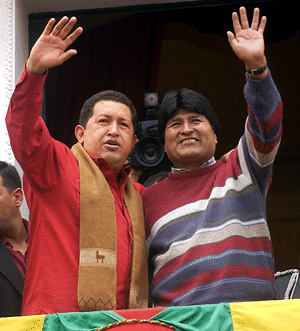Latin America Mourns Hugo Chavez
March 6, 2013
Governments and people across Latin America expressed sorrow today at the death of Venezuelan President Hugo Chávez. A charismatic leader, Chávez had aroused deep loyalty and deep hatred for his socialist policies, which included using Venezuela’s oil profits to fund government programs for the poor, and for his strident criticism of the United States. His critics pointed to Venezuela’s rocky economic record during his tenure in office and to his efforts to muzzle opposition and strengthen his grip on power.
Chávez became president of Venezuela in 1999. In 2005, he began using the term “21st century socialism” to describe the kind of government he wanted to create. Opponents claimed that he would try to make Venezuela a communist nation. Chávez became an ally of the Cuban Communist leader Fidel Castro, but his ideas have been influenced even more by the South American revolutionary Simón Bolívar.

Hugo Chavez (left) waves to a crowd with his close ally, President Evo Morales of Bolivia. (AP/Wide World)
Hugo Rafael Chávez Frías was born on July 28, 1954, in Sabaneta, in the state of Barinas, Venezuela, to a poor family. He graduated from the Venezuelan Military Academy in 1975 and became an army officer. In 1992, Chávez led a failed coup (government take-over) against elected President Carlos Andrés Pérez. Chávez became a popular hero during a time of public discontent with the government. He won the presidential election in 1998.
In a public referendum (direct vote by the people) in 1999, Chávez gained approval for a new “Bolivarian Constitution” for Venezuela. He was reelected to a new six-year term in 2000. Most Venezuelans supported political change. However, many wealthy and middle-class Venezuelans became alarmed as Chávez’s government increasingly took over decision making for the petroleum industry and began shifting wealth to the poor. Chávez used profits from oil sales to fund social services for the lower classes. Opponents accused him of buying political support.
In 2004, Venezuelans voted in a referendum, organized by Chávez’s opponents, on whether he should remain in office. Chávez survived the referendum as president. He was reelected president by a wide margin in December 2006 and by a smaller margin in 2012. Owing to illness, Chávez was unable to attend his inauguration in January 2013.


